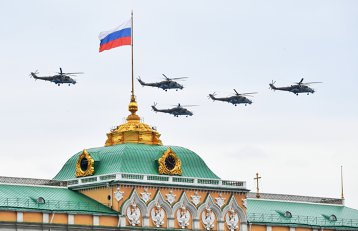
How long will China wait to take over Taiwan?
During the 70’s, the Chinese leader Mao Zedong was saying to American president, Richard Nixon- the one who was stating that the world should be opened towards China, and China towards the world- and his counsellor, Henry Kissinger, that his country can take over Taiwan anytime in the following one hundred years.

2020, a deadline for courageous strategic objectives
Among the deadlines China has to reach its goals, there is one that has highly importance in the strategic documents, 2020, a date whereat a series of objectives, more or less linked, should be accomplished. Therefore, by 2020, China wants a 60% urbanization rate, the completion of the space station, have its first domestic aircraft carrier, double its GDB and become Internet’s power. Most likely, reaching these goals is the perfect proof that the Chinese dream is possible and about to happen, is part of the anniversary gift for the 100 years since the Chinese Communist Party’s establishment, soon to be celebrated in 2021.
As for foreign policy, president Xi’s vision is alternative diplomacy (Zheng Wang, the director of the Center for Peace and Conflict Studies, from Seton Hall University), determined by the will be receive more respect on the international scene, another objective to be evaluated in 2020.
In the recent strategic document issued by the Intelligence Office of China’s State Council, China’s National Defence in the new Era, 2020 is the deadline for one of national army’s defence development uppermost objectives, which is the significant increase of informatization and strategic capacity.
China’s actions in South China Sea can also be regarded through these lenses, all the more so in that document referring to Defence’s policy it is reminded that solving Taiwan’s issue and creating country’s complete reunification is part of Chinese nation’s basic interests.
China’s National Defence in the new Era
This is the ambitious and pledging title of a strategic document that provides an explanation for defence policy, or a glove-lifting gesture thrown by the US through its own national security and defense documents. Such documents, the developments they anticipate, have made China the key target in strengthening the US military forces and have designated it as America's main strategic competitor (Anthony H. Cordesman, Center for Strategic and International Studies). There are also voices claiming that China’s National Defence in the New Era should be read rather as a report sheet on the status of People's Liberation Army reform, rather than as a strategic document (Meia Nouwens, a researcher for China's Defense Policy at the International Institute of Strategic Studies).
Concretely, this document includes an assessment of the international security situation and provides an official explanation for China's defence policy. He announces a military policies system, which, in fact, highlights party's control over military forces and leadership.
Its main topics: Defence costs are reasonable and adequate, and China's national defense policy is purely defensive, not offensive, and actively serves the establishment of a community of a commonly shared human destiny.
The community of a common future, the community of a shared destiny is a concept promoted by the former Chinese Communist Party’s Secretary General, Hu Jintao, and further supported by the current Secretary General, Xi Jinping. Some analysts see it as an essential element in China's foreign policy, which suggests shifting the focus from a predominantly national orientation to an interest towards the entire humanity and aims to build a proper framework for international relations. The presence in the State Council document of the community with shared human destiny as a Defence objective would suggest that this new community wants to replace the US supremacy (Elizabeth Economy, the director of Asian studies of the Council on Foreign Relations).
According to the recent strategic document, China's armed forces are adapting to the new landscape of strategic competition, dominated by the United States, seen as reason of all regional and global instability, due to its military alliances, ongoing operations and external interventions. The US has significantly increased its Defence spending, boosted the achievement of additional nuclear capacity, one to be used in space, and has increased its cyber defence.
In the document, it is claimed that the New China (People's Republic of China) has never caused a fight or conflict. It has, however, a great capacity to its the national sovereignty and territorial integrity and will not allow any person, organization or political party to divide any Chinese territory from China.
Therefore, China is a defensive player, but one that is sensitive when it comes to its territory. The socialist model built by Beijing goes for the strategic decision to follow the peaceful path, however protecting country’s sovereignty, security and development by discouraging aggression, eliminating Tibet-type separatist movements and opposing Taiwan's independence.
The US-Taiwan relations- given the strategic ambiguity of the massive armament delivery
During the 1995-1996 Taiwan Strait missile crisis, the Chinese military officials asked then-Defence Secretary Joseph Nye, the author of the soft power concept, if America would interfere in a China-Taiwan conflict. Nye replied: It depends on the circumstances, without any US official offering any further explanations later.
The way Beijing interpreted that statement could be seen from that moment on, Taiwan - a democratically governed island that got separated from continental China governed by the Communist Party during the civil war of 1949 - continues to be a chess piece, a negotiation element between US and China, which wants complete reunification.
In April, this year, US celebrated 40 years since ending the Taiwan Relations Act (TRA), a law that regulates, from 1979, the US-Taiwan relations and, with the authorization of the American Institute in Taiwan, has created mechanisms to support the economic and cultural bilateral relations, when US decided to end its diplomatic ties with Taiwan and recognize only one China: People's Republic of China.
The law regarding the relations with Taiwan does not guarantee that US will militarily intervene if People's Republic of China attacks or invades Taiwan. The document states, however, that the United States will provide Taiwan the necessary Defence articles and Defence services to allow Taiwan to keep a proper self-defense capacity.
The policy adopted by the US was called strategic ambiguity, being a formula that theoretically discourages Taiwan from a unilateral independence declaration, but also China from a unilateral unification.
Although TRA is more of a statement of intent, a political statement that does not guarantee the armament sale to Taiwan, many US administrations have sold armament to Taiwan in accordance with that, despite negative reactions from People's Republic of China, wherefore TRA represents US’s unwarranted intrusion in China’s home affairs, one to disrespect One China and the Three communique policy.
The Three communiques are formal statements issued (in 1972, 1978, 1982) jointly by the governments of the United States and People's Republic of China, according to which the government of People's Republic of China is China’s only legitimate government, Taiwan is part of China, the US relations with Taiwan are unofficial and the unification is an internal business.
Subsequently, the US unilaterally completed the Third Communique, by adopting the so-called Six Assurances to Taiwan. The Six Assurances are six purely informal foreign policy principles, created before 2016, when the US Representatives House passed a resolution on their content, but was not either obligatory. According to the Six Assurances, the US will not set a date for ceasing armament sales to Taiwan, will not change TRA’s terms, will not consult with China before making any decisions on arms sales to Taiwan, will not mediate the Taiwan-China negotiations, will not change their stance on Taiwan's sovereignty, will not pressure it to negotiate with China and they will not officially recognize the Chinese sovereignty over Taiwan.
President Clinton changed this position in a statement known as Three Noes: we don't support independence for Taiwan, or 'two Chinas', or "one Taiwan, one China', and we don't believe that Taiwan should be a member in any organization for which statehood is a requirement." A kind of corollary has been added to the Bush Administration: the United States will oppose any unilateral attempt to change the status quo. Starting with September 2018, the Trump administration has stated that the US-Taiwan relationship is guided by the Six Assurances.
In the meantime, circumstances surrounding documents’ completion, which are governing the US-China-Taiwan relations have changed: Taiwan has undergone a democratization process and, currently, it is a major US trading partner.
And in all this complicated relationship, the armament sales remained the hot spot. It seems that Washington would have sold armament to Taiwan worth of $ 15 billion, since 2010 to date.
The friendly relationship between Washington and Taipei is, at least for now, a feature of Trump's mandate. Earlier this year, Democratic Senators Bob Menendez, Catherine Cortez Masto and Chris Coons, along with Republican Senators Tom Cotton and Ted Cruz, drafted the Taiwan Insurance act of 2019. Among other things, the bill requires the Defence Department to make efforts to include Taiwan in military training exercises and expresses congressional support for regular armament sales to Taiwan.
Will 2020 be the decisive year for reunification?
In May, high-level security officials from US and Taiwan met, for the first time in almost four decades, creating major discontent in Beijing. The law project drafted in June, Intelligence Authorization Act for Fiscal Year 2020, which refers to the authorization of US intelligence agencies’ activity, prior to budgets’ allocation, asks the intelligence community director to elaborate, within 45 days from the following Taiwan's presidential election, a report on Chinese efforts to undermine the scrutiny and recommends US actions to stop such operations. And these elections will take place in… 2020.
As for China, it is following its One China policy. According to the Anti-Secession Law from 2005, if the secessionist forces, "Taiwan's Independence", were to take action or in case of major incidents, Beijing can use non-peaceful means and other necessary measures.
And in the China National Defence in the New Era, the separatist forces "Taiwan's Independence" and their actions remain the most serious immediate threat to peace and stability against Taiwan’s Strait and the biggest barrier which blocks country’s peaceful reunification. And while it is noted that the China-US military relationship remains, generally, stable, Beijing makes no promise of giving up the use of force.
Taiwan has its own political system, its own currency, its own government, its own foreign relations and its own economic policy. Apparently, it also has a constantly growing feeling of his own identity as an independent and sovereign nation, not as being part of China. It is located in one of the most important shipping routes, linking Middle East oil and gas supply to East Asian economies and continues to be strategically important for Beijing and Washington.
Mao Zedong's assertion from the 1970’s could be seen as the fear expressed by President Nixon in 1994: the possibility of creating a Frankenstein in China.
Then, it followed Kissinger’s reply, a warning to Taiwan, a little later, in 2007: China will not wait forever!
Translated by Andreea Soare


